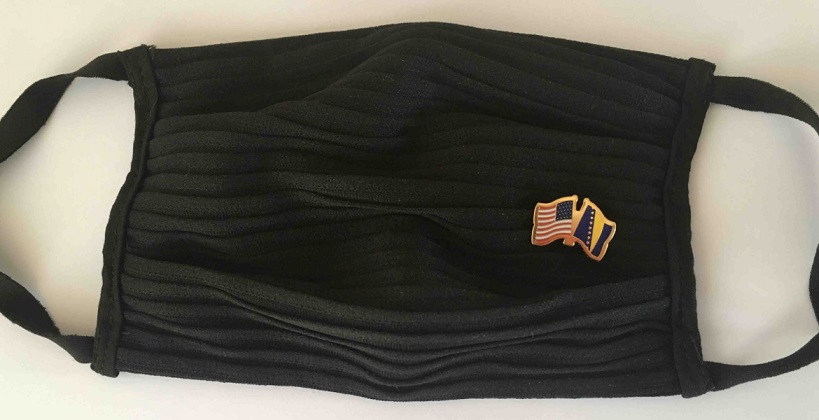
Unmasked Self-Dealing: Different Games, Same Goal
Unmasked Self-Dealing: Different Games, Same Goal
– Valery Perry
Valery Perry, DPC Senior Associate
While my colleague Kurt Bassuener pointedly described Donald Trump as “America’s first Balkan president” in 2019, the parallels have been evident to followers of politics in the US and the Balkan region for some time.
Aleksandar Hemon presciently identified Trump’s evident and opportunistic populism in 2016; and more recently he pointed out the seemingly inevitable next phase as Trump’s followers have been steadily radicalized and primed for action, whether through the ballot box or as armed gangs laying physical claim to the public square. Hemon has seen this all unfold before, and knows well the impact on his native Bosnia and Herzegovina.
One can never discount the visceral and emotional element that characterizes the relationship between populist, nationalist leaders and their willing followers, or the ease with which “blood and soil” becomes the basis for both sloganeering and a purported policy option. However even the most effective propagandists would fail in the absence of a fertile ecosystem for such shallow yet somehow seductive platitudes.
The perverse sexiness of propagandists get the most attention in any age – from Leni Riefenstehl’s Nazi fever dreams to the mastery of social media tools by reprehensible groups ranging from ISIS to the violent far-right. Yet more mundane explanations for the social readiness of populations to fall prey to such spectacle can very often be found in the dullest mechanisms of accountable governance and independent oversight, and the lived despair and frustration-fuelled grievance that mushrooms in its absence.
Seeing the impact of weak (or weakening) accountability mechanisms in the seemingly very different cases of Bosnia and the US show the challenges and threats regardless of scale and scope, and in spite of the seeming “maturity” of democratic institutions in the latter.
In Bosnia and Herzegovina the velocity of corruption’s acceleration has been swift, its pursuit blatant – but completely predictable. The notion that a rural berry farmer would suddenly be managing multi-million dollar deals to procure ventilators from China is indeed ludicrous, and has been treated as such by irate citizens on social media. However it is an obvious target mostly because it is simply a visible and easily understandable example of self-dealing, simpler to grasp than much more complex multi-year schemes, or the technocratic financial shell games of public budget rebalancing.
In the US the acceleration of corruption and malgovernance has been equally shameless, but comes with a much higher price tag. In terms of ease of understanding, the American berry farmer equivalent might be the failed $69 million ventilator procurement deal that was essentially brokered over Twitter.
Yet even more nefarious is the systemic and systematic influence peddling that has steadily taken over Washington since it was turned into an art form in the 1980s (not coincidentally by several men who would go on to advise Trump.) While arguably unethical, much of this is legal, though overreach has led to lawbreaking as well.
A lengthy whistleblower report recently filed in the US directly noted pressure to steer contracts to companies and individuals with personal ties to the Trump family, beginning already in 2017, but now also during the heightened pressure of the pandemic, as huge public sums are suddenly available. The whistleblower explicitly called for an investigation by the inspector general, “to help break up the ‘cottage industry’ of marketing consultants and political influence into these contracts.”
This is legalized corruption, given a veneer of respectability but at the end of the day equally demonstrating the corrosive practice of transferring public resources towards targeted and personal private gain.
In normal times in the US, abuses of this kind this would be (imperfectly) countered as the system’s auto-immune response kicked in – the lauded “checks and balances” of American governance. However, in line with Trump’s ongoing war on independent oversight that hampers him from rewarding his family and friends, these accountability mechanisms themselves are under threat.
And these cases are not just about money being skimmed off the top and stolen. They are about intentionally undermining trust in democratic and accountable systems and processes of governance. In the absence of trust, and particularly in environments of growing inequality, disenchanted citizens can more easily withdraw from public space, or gravitate towards their own tribal politics, whether that is through joining a party, donning a red cap, or fall prey to more extreme affiliations online, or in the real world.
In these environments, the very basic citizen solidarity needed to serve as an additional correction to abuse frays. And this is not an unintentional byproduct of innocent theft. It is the goal of state – or party – capture.
The irony is not lost on those familiar with years of American support for whistleblower and other anti-corruption programs abroad as a part of general democratization support programming. Those who share DPC’s foundational commitment to for accountability in democracy promotion recognize how damaging such blatant malfeasance is, feeding cynicism on hypocrisy in “the West”. Yet such a humbling also demonstrates that there is no magic wand; no country or political system is immune to exploitation and institutionalized corruption. Citizens who believe in a right to accountable governance increasingly recognize they are all fighting the same fight.
Events unfolding in both the US and BiH – in spite of the massive differences in scale and influence – represent an official political disregard for the established institutions of transparent decision-making on how the people’s tax money should be allocated for the public good. And both represent the rot that happens when kafana or country club politics allows for and facilitates nepotism and self-dealing at the expense of sound and transparent public policy held in check by independent oversight
